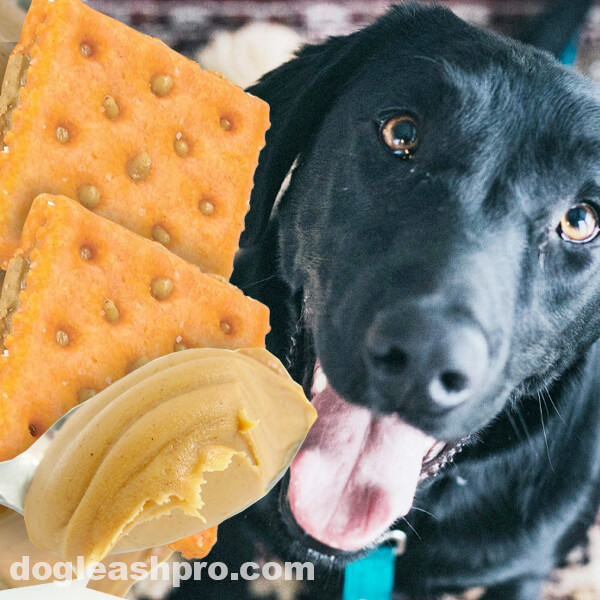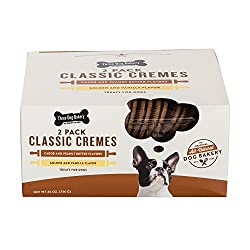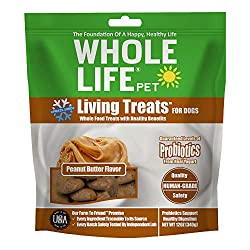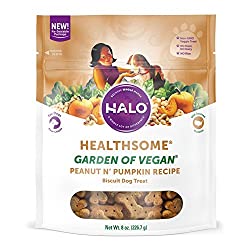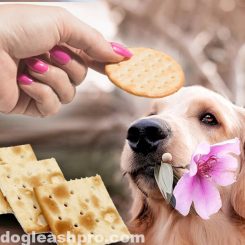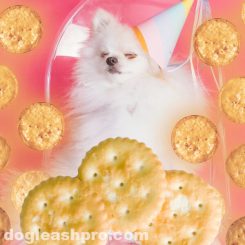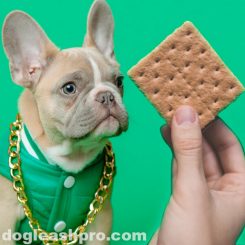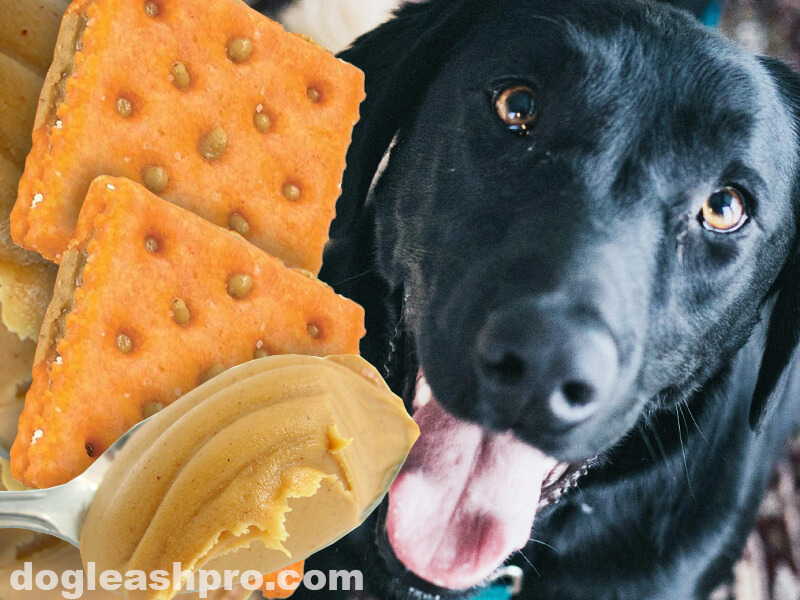
Peanut Butter Crackers are crunchy and tasty. It’s a popular snack choice amongst those who love Peanut Butter. There are some who prefer Peanut Butter between two Ritz Crackers instead of the regular Peanut Butter Crackers. I had some Peanut Butter Crackers yesterday and my dogs wanted some. Before giving them one, I wondered if this snack is safe for doggy consumption.
Can dogs eat Peanut Butter Crackers? Yes, dogs can eat Peanut Butter Crackers if they are homemade and in moderation. Store-bought Peanut Butter Crackers usually contain high levels of sugar and salt, which can cause canine obesity and sodium poisoning if eaten regularly. Beware of toxic ingredients like xylitol in the Peanut Butter Crackers as this sweetener is toxic to dogs.
If you have large or giant dog breeds like Pit Bulls, Bernese Mountain Dogs, Great Dane, Saint Bernard, or Siberian Huskies, they can eat a tiny bit of the store-bought Peanut Butter Crackers. Small dog breeds should avoid Peanut Butter Crackers at all costs.
Table of Contents
Are Peanut Butter Crackers good for dogs?
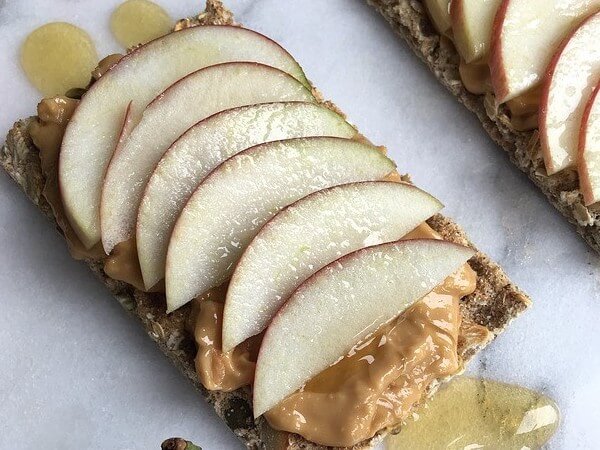
While a little bit of store-bought Peanut Butter Crackers can be good for dogs, it’s best that your furry friends do not eat these regularly. Instead, opt for a healthier canine-friendly peanut butter treat like this one, which we highly recommend. Our dogs jump for these Peanut Butter cookies every time!
There are many reasons our pooch should avoid store-bought Peanut Butter Crackers. First, let’s take a look at what they are and whether the ingredients in the Peanut Butter Crackers are safe for doggy consumption.
Peanut Butter crackers: What is it?
Peanut Butter Cracker is a simple cracker sandwich with a bit of peanut butter spread in between the two crackers. It is a popular crunchy snack for everyone of all ages and can be satisfying due to the Peanut Butter filling. One can snack on it while driving a car, reading a book, or watching tv.
There are a variety of Peanut Butter Crackers, including Ritz Peanut Butter Crackers, Austin Peanut Butter Crackers, Keebler Peanut Butter Crackers, and Lance Toast Chee Peanut Butter Crackers to name a few.
Peanut Butter Crackers ingredients
We’ll list the ingredients in one of the most popular Peanut Butter Crackers as an example.
Austin Peanut Butter Crackers ingredients
Here are the main ingredients used to make the Austin Peanut Butter Crackers:
- Enriched flour from wheat flour, niacin, reduced iron, vitamin B1 (thiamin mononitrate), vitamin B2 (riboflavin), and folic acid.
- Soybean oil with TBHQ for freshness.
- Peanut butter from roasted peanuts.
- Sugar.
- Dextrose.
The Austin Peanut Butter Crackers also contains 2% or less of the following ingredients:
- Salt.
- Malt powder from malted barley flour, wheat flour, and dextrose.
- Leavening from baking soda, monocalcium phosphate, and sodium acid pyrophosphate.
- Soy lecithin.
- Whey.
- Yellow 6.
- Red pepper.
- Cheddar cheese from milk, cheese cultures, salt, and enzymes.
- Disodium phosphate.
- Buttermilk.
Ritz Peanut Butter Crackers ingredients
Let’s take a look at the ingredients in Ritz Peanut Butter Crackers:
- Unbleached enriched flour from wheat flour, niacin, reduced iron, thiamine mononitrate (vitamin B1), riboflavin (vitamin B2), and folic acid.
- Peanut butter (roasted peanuts, salt, and hydrogenated vegetable oil which includes rapeseed, cottonseed, and soybean oils.
- Canola oil.
- Sugar.
- Palm oil.
- Dextrose.
- Leavening from baking soda and/or calcium phosphate.
- Salt.
- Soy lecithin.
- Milk.
As you can see, both the Austin Peanut Butter Crackers and the Ritz Peanut Butter Crackers share a lot of the same ingredients.
The ingredients contain dairy products, soy, peanut, and wheat ingredients. If your furry friends are allergic to any of these ingredients, you should avoid feeding them Austin Peanut Butter Crackers.
Let’s go over the ingredients in detail to fully understand why dog owners should avoid feeding their pooch store-bought Peanut Butter Crackers.
Fun Fact: The tiny crunchy Goldfish crackers also contain several of the same ingredients used to make Peanut Butter Crackers. To find out if Goldfish crackers are safe for dogs to eat, you’ll want to check out our article Can Dogs Eat Goldfish?
Enriched flour contains wheat which is harmful to dogs with wheat allergies
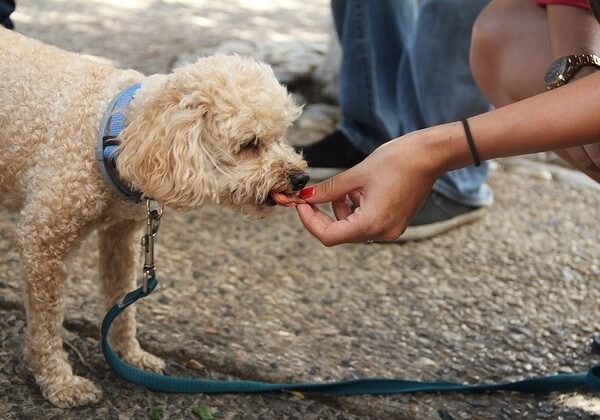
In general, our furry friends do not need flour in their daily diet. If you see flour as one of the ingredients in your dog’s food, it is usually used to bind several ingredients together.
Enriched flour is highly processed. It starts off as wheat grains and gets converted into flour through processing. During this flour processing, many of the natural nutrients are lost.
For instance, during the grains to flour processing, the bran of the seed that contains minerals, protein, and fiber gets removed from the grain. The germ, which contains minerals and B vitamins, is also removed because it has a 10% fat content which will decrease the flour’s shelf life. Removing the germ allows the flour to have a longer shelf life.
As you can see, all the natural nutrients were removed during the processing so enriching the flour helps to restore the nutrients it lost such as iron, vitamin B1 (thiamin mononitrate), vitamin B2 (riboflavin), vitamin B3 (niacin), and vitamin B9 (folic acid).
Folic acid is man-made and manufactured. When folic acid is digested, it converts into folate.
You’ll notice all of these hard-to-pronounce vitamins on the ingredient list. While they are helpful to dogs, it is recommended that our furry friends receive these vitamins and iron from their regular dog food or from nutritious food that is canine-friendly. They should not get these health benefits from human snacks that have a high-fat content.
Additionally, the enriched flour ingredient in Austin Peanut Butter Crackers contains wheat flour, which is an absolute no-no for dogs. Wheat is one of three flour types that dogs should avoid. The other two are soy and corn.
Some dogs may be allergic to wheat. Please do not feed your canine friends Austin Peanut Butter Crackers if they have wheat allergies. If you’re not sure whether they have wheat allergies, you can call your vet or take them to a vet for a checkup. The checkup will allow the vet to properly diagnose any allergy your pooch may have.
Symptoms of wheat allergy in dogs usually start with their skin and coat. Here are some signs of wheat allergy in dogs:
- Flaky, dry, and itchy skin.
- Loss of hair or coat.
- Rash or bumps on the skin.
- Gastrointestinal upset.
- Frequent licking of the paws.
- Paw pads are red and inflamed.
- Upset stomach.
If this is your dog’s first time trying food that contains wheat or flour, a key rule of thumb is to only give him a little and see if he reacts. If he does, it’s best to avoid feeding them food that contains flour or wheat.
Soybean oil with TBHQ is harmful to dogs
Soybean oil is harmful to dogs with soy allergies. If your pups are allergic to soy, please avoid feeding them Austin Peanut Butter Crackers. Soybean oil also has more saturated fat than other vegetable oils.
Soybean oil is also not the best type of oil for our four-legged friends. Instead of soybean oil, it’s best to go with:
- Coconut oil.
- Fish oil.
- Olive oil.
- Sunflower oil.
- Flaxseed oil.
Additionally, you can see in the ingredient list that the soybean oil contains TBHQ. Tertiary butylhydroquinone or TBHQ is a chemical preservative that is bad for dogs. The rule of thumb is if you can’t pronounce the ingredient in a certain food or don’t know what it is, it is usually best to avoid that food.
TBHQ does not provide any nutritional value. Instead, it is used to prolong the shelf life of the food.
In the case of Austin Peanut Butter Crackers, the TBHQ in soybean oil is used as an antioxidant that protects food that contains iron from discoloration. Research shows that continuous consumption of food with TBHQ can cause DNA damage and cancer precursors in the dog’s stomachs.
When I found out about this, I refused to give any more Austin Peanut Butter Crackers to my furry family members. This information alone was enough to scare me.
Peanut butter from roasted peanuts is fine for dogs in moderation
Peanut is generally safe for dogs if it is dry-roasted, raw, and plain (unsalted). From the ingredient list, we don’t know if the roasted peanut is plain or salted.
We can’t assume that it is or isn’t so it’s best to avoid giving your furry friends the peanut butter spread in the Austin Peanut Butter Crackers.
Instead, dog owners are better off feeding their furry pooch homemade Peanut Butter. If your pups want something crunchy, sprinkle some fairly crushed Sunflower Seeds on top of the Peanut Butter. This way, you know what is in the peanut butter such as the amount of salt and oil used.
While peanuts are packed full of healthy fats, niacin, vitamins such as B6 and E, and protein, it’s important to note that they do have high levels of fat. Dogs that eat peanuts regularly or in large amounts can get an upset stomach, digestive upset, and pancreatitis in severe cases.
For these reasons, try making your own Peanut Butter Crackers for your four-legged friends and only feed them Peanut Butter occasionally and in moderation.
Excessive sugar consumption is harmful to dogs
There are 0.8 grams of sugar in one Austin Peanut Butter Cracker. While it may not sound like a lot to you, it is definitely a lot to dogs. That is 0.8 grams of sugar that your canine friends do not need. This amount of sugar may cause excessive sugar consumption in dogs.
Dogs should only consume sugar from natural fruits and vegetables such as carrots, sweet potatoes, and bananas. They should get their sugar from good carbohydrates. Carbohydrates include dietary fibers, starches, and sugar.
When our furry friends ingest too much sugar, there are negative consequences. Your pooch may gain weight. Over time, regularly consuming too much sugar can lead to canine obesity. This is particularly dangerous and true for inactive or lazy dog breeds like Chihuahuas, Bulldogs, Shih Tzu, or Saint Bernards.
Unfortunately, canine obesity can lead to diabetes, specifically Type II diabetes.
Additionally, sugar can lead to dental issues such as tooth decay and cavities. The bacteria in your dog’s mouth can use sugar to produce acids. The acids are dangerous for your puppy’s teeth because it can wear down the mineral in his tooth enamel. This causes tooth decay.
For these reasons, let’s keep the Austin Peanut Butter Crackers away from your dog’s reach.
Dextrose is unnecessary in a dog’s diet
Unless your furry friends have low blood sugar or are hypoglycemic, dextrose is not necessary for their daily diet. Dextrose is usually administered to dogs as a form of treatment such as through dextrose injection in order to bring their blood sugar level up. Thus, our furry pups do not need dextrose in their diet.
Excessive salt can cause sodium-ion poisoning in dogs
One of the Austin Peanut Butter Crackers contains 50 mg of sodium. That is a lot of sodium for a dog. Although our canine pups need salt to have proper cell functions, too much salt intake can harm their health.
Our furry friends should only have their salt intake from their main meal and not from snacks.
Keep in mind that our pups should have between 0.25 grams to 1.5 grams of salt for every 100 grams of the food. Just 50 mg of sodium from one Austin Peanut Butter Cracker would already fulfill 0.05 grams of your dog’s daily salt intake from a snack that is not healthy for him.
You’ll want to keep a close eye on your four-legged pups if they’ve consumed more than one Austin Peanut Butter Cracker to see signs of sodium poisoning.
Here are some signs of salt poisoning:
- Very thirsty leading to frequent urination.
- Convulsions, seizures, or tremors.
- Muscle and body weakness.
- Diarrhea.
- Vomiting.
- Lethargic.
- Loss of appetite.
- Confusion and lack of coordination.
Leavening agents are not ideal for doggy consumption
The leavening agent that is used in Austin Peanut Butter Crackers includes baking soda, monocalcium phosphate, and sodium acid pyrophosphate.
These hard-to-pronounce ingredients do not provide nutritional value to our pooch. Instead, it is actually used to make holes in the Austin Peanut Butter Crackers. That’s why you see about 10 holes in this cracker.
Dogs generally do not need baking soda in their diet so it’s not a good idea to feed them food or treats that contain baking soda. If you must feed your pooch food or snacks with baking soda in it, limit to 5 to 11 teaspoons per pound of their body weight.
Monocalcium phosphate is usually used in pet food. It is used to add calcium to the food. While our furry friends need calcium, they don’t need to get it from Peanut Butter Crackers. Instead, they should have calcium from their regular dog food.
Now when it comes to sodium acid pyrophosphate, dog owners need to be on the lookout for this compound. Consuming too much sodium acid pyrophosphate can cause the following symptoms in dogs:
- Chest pain.
- Frequent coughing.
- Respiratory tract irritation.
- Nosebleeds.
- Nausea.
- Vomiting.
- Diarrhea.
For this reason, we highly recommend that you do not feed your canine friends Austin Peanut Butter Crackers. Dogs can easily crunch down a few Peanut Butter Crackers when you’re not looking and this can be dangerous.
Soy lecithin is harmful to dogs with soy allergies
As the name suggests, soy lecithin contains soy. If your canine friends have extreme soy allergies or are highly sensitive to soy products, keep Austin Peanut Butter Crackers away from them.
Also, it’s important to point out that lecithin is not a necessary nutrient for our canine companions. Their liver produces enough lecithin for them that they don’t need this from anywhere else. In fact, their liver produces about 3.6% of lecithin.
If your pooch is on a weight management diet, they should not have lecithin. The use of soy lecithin does not provide any nutritional value to your pup. Instead, it is used as an emulsifier and is used to increase the shelf life of food and prevent the sugar from crystalizing.
Your pooch is better off getting lecithin from natural dog-friendly food such as cabbage, cauliflower, Brussel Sprouts, broccoli, and chicken liver or kidneys and not from Peanut Butter Crackers.
Whey is safe in moderation for dogs
Be careful when feeding your pooch food that contains whey because it does come from dairy. Our canine friends should get their whey intake from meat products like chicken, turkey, fish, or lean beef. They do not need whey from Peanut Butter Crackers.
Yellow 6 is harmful to dogs
Yellow 6 is an artificial dye to make the Peanut Butter Crackers yellow. This coloring additive is not safe for humans because it can cause cancer, behavioral problems, hyperactivity in children, and allergies.
There are studies that show that when animals consume food that contains yellow 6, they start to have kidney tumors and adrenal gland tumors. There is also a correlation between yellow 6 and chromosomal damage, asthma, and skin issues.
These are enough reasons to avoid feeding food like Austin Peanut Butter Crackers to your four-legged friends.
Red pepper is fine for dogs
While red pepper is fine for dogs, there’s less than 2% so your pooch will receive very little health benefits from it so it’s best to avoid feeding them Peanut Butter Crackers.
Instead, it’s best to feed them a moderate amount of the actual red bell pepper fruit as this fruit is packed full of antioxidants, and vitamins A, C, and E.
Handy Hint: Try to avoid feeding your furry friends spicy Banana Peppers because dogs do not tolerate spice flavors well. Keeping it plain and simple is the key to a healthy dog diet.
Cheddar cheese is not ideal for doggy consumption
The cheddar cheese in these Peanut Butter Crackers contain milk, cheese cultures, salt, and enzymes. Once again, we see salt as one of the ingredients in cheddar cheese, which is not great for our canine pooch.
The best type of cheese for dogs is actually not cheddar cheese. It is low-fat cheeses like:
- Cottage cheese (lower in sodium, fat, and lactose when compared to other types of cheese).
- Soft goat cheese.
- Mozzarella cheese.
Disodium phosphate is harmful to dogs
Disodium phosphate is a harmful ingredient in Peanut Butter Crackers that your canine pups should avoid. Disodium phosphate is also known as DCP and it is an additive that helps to improve the texture of the food.
Research has shown that disodium phosphate has caused kidney stones in dogs as well as soft tissue calcification. We highly recommend that you avoid feeding your precious pooch any food that contains disodium phosphate including Peanut Butter Crackers.
Are Peanut Butter Crackers safe for dogs as a snack?
So if you’re still wondering if store-bought Peanut Butter Crackers are safe for dogs as a snack, the answer is no. If your canine friends love Peanut Butter snacks, we recommend that you make the Peanut Butter Crackers yourself at home so they are safer for your dogs to eat.
You’ll also know what ingredients went into making the Peanut Butter Crackers and be able to control the amount of each ingredient you use.
Austin Peanut Butter Crackers Nutritional Profile (1 Peanut Butter Cracker or 6.5 grams)
| Name, Unit | Amount |
| Calories, cal | 32 |
| Total Fat, g | 1.5 |
| Saturated Fat, g | 0.3 |
| Sodium, mg | 50 |
| Total Carbohydrate, g | 3.8 |
| Sugar, g | 0.8 |
| Fiber, g | 0.2 |
| Protein, g | 0.7 |
This means that one Austin Peanut Butter Cracker has 32 calories, 1.5 grams of fat (0.3 grams saturated), and 3.8 grams of carbohydrate (0.8 grams of sugar). This equates to about 92% in sugar and fat. If your canine friends eat the Peanut Butter Cracker, that’s like eating raw fat and sugar.
This means that our canine friends are better off eating natural fruits, vegetables, and meat than eating Peanut Butter Crackers.
If you’re not watching, they can accidentally ingest several of these crackers relatively fast. Since dogs don’t really chew their food, the sharp edges of the Peanut Butter Crackers can likely cause internal injuries to their mouth and throat. The sharp edges can cut their mouth, tongue, and esophagus.
Should Peanut Butter Crackers be a staple food in my dog’s diet?
For the reasons stated above, Peanut Butter Crackers should not be a staple food in your dog’s diet. It’s also not the best snack option either. Dogs should avoid store-bought Peanut Butter Crackers at all costs since they are high in fats, salt, and sugar.
If your pooch loves Peanut Butter Crackers, opt to make them yourself at home so you know what ingredients you used to make them. This is a healthier alternative than Peanut Butter Crackers that are made for human consumption.
If you don’t have time or prefer to offer your pooch canine-friendly Peanut Butter dog treats, we highly recommend this one. This is one of the Peanut Butter treats we give our Chihuahua and Labrador and they both love it.
Can dogs eat cheese Peanut Butter Crackers?
Yes, dogs can eat cheese Peanut Butter Crackers in moderation only if the crackers are free from additives, preservatives, and do not contain ingredients that are toxic to dogs. Cheese actually contains vitamins such as vitamin A and B-12 as well as protein, fat, calcium, phosphorus, zinc, and riboflavin that are helpful to dogs.
It’s preferred to feed your dog homemade cheese Peanut Butter Crackers instead of the store-bought cheese Peanut Butter Crackers. You’ll know the ingredients in these crackers and how much salt and other ingredients they contain. Keep in mind that moderation is key and cheese Peanut Butter Crackers should be a rare occasional treat.
Can dogs eat crackers with Peanut Butter?
Yes, dogs can eat crackers with Peanut Butter in moderation as long as neither the cracker nor the Peanut Butter contains any ingredients that may be harmful or toxic to dogs such as xylitol. Xylitol is a sweetener and it is lethal to our furry friends.
Before feeding your dogs crackers with Peanut Butter, make sure to take a look at the ingredients first to ensure they are safe for doggy consumption. Like cheese Peanut Butter Crackers, it’s best if the crackers with Peanut Butter are homemade. This way, you’ll know what ingredients were used in the crackers and in the peanut Butter.
The ingredients and their amounts should be dog-friendly. Again, moderation is important and crackers with peanut butter should be a rare special treat.
How many Peanut Butter Crackers can I give to my dogs?
If you must, only give your dogs one Peanut Butter cracker to munch on. We advise that you consider the size of your pooch. If they are a big dog breed or an active dog breed, then it’s fine giving them one Peanut Butter cracker.
However, if you have small dog breeds or inactive dog breeds, avoid feeding them any store-bought Peanut Butter crackers at all. Instead, make dog-friendly Peanut Butter crackers at home if they love Peanut Butter so you can control the amount for each ingredient you use to make them.
Can dogs eat Peanut Butter cookies?
Yes, dogs can eat Peanut Butter cookies in moderation, and if the Peanut Butter cookies do not contain harmful ingredients such as added sugars like xylitol, preservatives, sweeteners, artificial flavors, or chocolate. If the store-bought Peanut Butter cookies contain any of these mentioned ingredients, it’s best that you don’t share them with your canine friends.
Most of the time, store-bought Peanut Butter cookies will contain one of the above-mentioned ingredients or will contain hidden ingredients that you may not be aware of.
In addition, most store-bought Peanut Butter cookies are made of wheat flour. If your pooch is sensitive to gluten or has a wheat allergy, it’s best that you do not give him Peanut Butter cookies.
Most dogs love Peanut Butter, but if your four-legged friends are allergic to Peanut Butter, then it’s not safe to feed them Peanut Butter cookies.
If your dogs love Peanut Butter cookies, we highly recommend that you homemade them for doggy consumption. This way, you’ll know what ingredients went into making them and you can control the amount of each ingredient that you’re putting in to make the Peanut Butter cookies.
Most homemade Peanut Butter cookie recipes call for both brown sugar and granulated sugar. If you’re making Peanut Butter cookies for your furry friends, we suggest using amaranth flour, garbanzo bean flour, oat, or sorghum instead of whole wheat flour, especially if your pooch has a wheat allergy.
Try using Peanut Butter that doesn’t have added sugar or sweeteners like xylitol and opt for mashed banana or unsweetened applesauce, as well as chicken, vegetable, or beef stock. Your fur babies will love you!
So, can dogs eat Peanut Butter crackers?
Dogs should only have homemade Peanut Butter crackers since store-bought Peanut Butter crackers are not safe for doggy consumption.
Your dog’s health and longevity start with what they eat. When it comes to our dog’s food, it’s best to only give them canine-friendly food. Many human foods are not made for canine consumption and Peanut Butter Crackers are one of them.
When dogs get a hold of something, they have a tendency to eat it as a way to explore what it is. It’s not surprising that they will eat just about anything and everything you give them. Even food that you did not offer them.
So be careful with leftover food that you leave on the table. Your canine pooch will jump and eat it if they can. Try to remove any leftover food from the table and keep them in closed containers in the fridge or on a high shelf where your pups can’t get a hold of it.
Related Questions
No, dogs should not eat Peanut butter and cheese crackers. They are high in fat, salt, and sugar. Regularly eating Peanut butter and cheese crackers can cause diabetes, obesity, and pancreatitis in dogs.
Try feeding your pooch low-fat cheese such as cottage cheese or mozzarella cheese if he is fine with dairy products and loves cheese. If your canine friends love Peanut Butter, making them homemade Peanut Butter is the best option.
No, dogs should not eat crackers and Peanut butter. In fact, there is no need for dogs to eat crackers. Crackers aren’t healthy for dogs and any nutrients from the crackers can be found in regular dog food. Thus, dogs should avoid eating crackers and Peanut butter since the store-bought ones are loaded with fat, salt, and sugar.
We can confidently say that dogs should not eat Austin Peanut Butter crackers due to the ingredients in these crackers. We’ve listed the ingredients in Austin Peanut Butter crackers above so you can make the best decision for your pooch.
There are several ingredients that are not safe for doggy consumption including enriched flour, soybean oil with TBHQ, sugar, salt, dextrose, leavening agents, soy lecithin, and disodium phosphate. Additionally, artificial dye and coloring additives are used such as yellow 6 that can cause cancer and skin problems in dogs.
DISCLAIMER: THIS WEBSITE DOES NOT PROVIDE MEDICAL ADVICE
The information, including but not limited to, text, graphics, images and other material contained on this website are for informational purposes only. No material on this site is intended to be a substitute for professional veterinary advice, diagnosis, or treatment. Always seek the advice of your veterinarian or other qualified health care provider with any questions you may have regarding dietary needs.
Resources:
https://www.charlotteobserver.com/news/local/article237440489.html
https://www.today.com/health/best-healthy-snacks-reach-when-money-tight-t181923

With over five years of specialized experience as an animal writer, my expertise lies in dog nutrition, health, behavior, grooming, and training. I am dedicated to delivering helpful and informative content that caters to the well-being of our furry friends. My primary goal is to empower pet owners with knowledge and ensure our canine companions thrive in health and happiness. In my free time, I love volunteering at local dog rescue centers.
